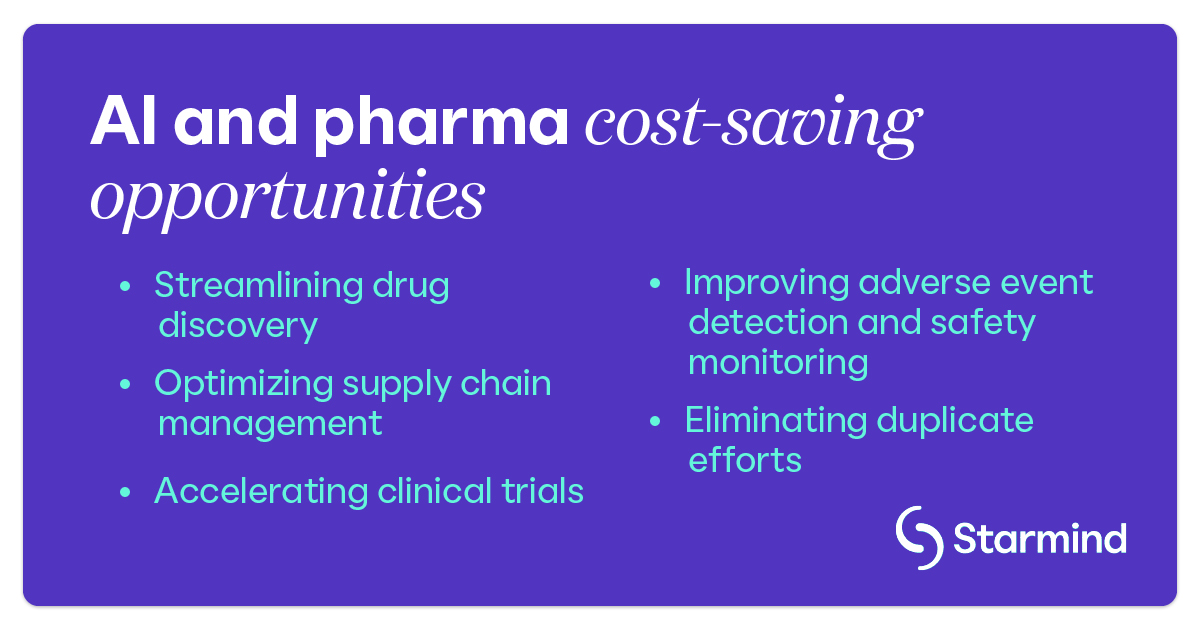How to drive cost savings with enterprise AI in pharma

Contents
There’s no doubt that incorporating artificial intelligence (AI) in pharma has already led to incredible breakthroughs and efficiency gains, and the future holds even greater potential. There are countless opportunities for companies to use AI to improve research and analysis, develop new solutions and save time. With the right approach, organizations can also leverage AI for another critical purpose — driving cost savings.
Bringing a game-changing drug to the market can be a multi-billion-dollar endeavor. Pharmaceutical companies face continued pressure to innovate and manage rising costs. AI can help solve both problems. Companies are flocking to tackle this problem, with 91 AI-focused companies in drug discovery established in the past two years alone. Additionally, collaborations are cropping up between big pharma companies and startups with new AI technologies.
Learn more about the transformative impact of artificial intelligence in pharma across all stages: R&D, clinical trials, personalized medicine and more. You’ll also learn about the financial opportunities associated with AI and how you can leverage AI-powered solutions to help your organization save money and drive stronger results.
Revolutionizing pharmaceutical R&D: Harnessing AI to combat escalating costs [DOWNLOAD REPORT]
What’s the role of AI in pharma today?
Companies across the pharma industry are finding use cases for AI. Here are some of the most promising applications.
Developing safe and effective drugs
AI in R&D accelerates drug discovery by analyzing vast amounts of data, predicting drug-target interactions and speeding up the identification of promising compounds. This saves researchers time and money in the early stages of drug discovery, allowing them to zoom in on the most viable candidates.
AI also helps pharma companies optimize drug development processes through predictive modeling and simulation techniques. By simulating the behavior of molecules and predicting their properties, AI identifies potential risks and challenges earlier and faster than prior methods. This allows humans to make more informed decisions and avoid costly dead ends.
For example, Eli Lilly uses AI to augment human productivity, saying that AI will save 2.4 million hours of human activity (274 years of work) by the end of 2023. Eli Lilly leverages AI to accelerate workflows, enable drug discovery and make other gains through more than 100 AI projects.
Accelerating clinical trials
AI plays a crucial role in optimizing clinical trials for new drugs. AI algorithms streamline patient recruitment, identify suitable trial participants and predict how patients will respond to treatments. AI can accelerate new therapies by improving trial efficiency and reducing the time required for recruitment.
AI-powered platforms can also play an important role in helping researchers quickly review results and access historical data. For example, with Starmind, R&D team members can ask questions about previous trials and studies and easily access results, as well as people involved in previous efforts. Not only does this help teams access information faster, but it can help avoid duplicated work and wasted efforts.
Researchers from Huntsman Cancer Institute, NYU Grossman School of Medicine and Flatiron Health developed a natural language processing (NLP) algorithm to solve the problem of unstructured electronic health records (EHRs). These records contain essential patient information but can be difficult to sort through in a timely, cost-effective manner.
By using NLP, the researchers could quickly extract Eastern Cooperative Oncology Group Performance Status (ECOG PS), which indicates the general health status of a patient with cancer. Having this status can improve oncology research, help determine eligibility criteria in clinical trials and facilitate regulatory and health technology decisions.
Tailoring Treatment
AI in pharma enables the analysis of large-scale patient data, which extends the possibilities for personalized treatment approaches based on individual characteristics. Algorithms can integrate patient-specific data, including genetic information, medical records and treatment outcomes, to identify patterns and make predictions about individual patient treatment responses. This personalized approach to medicine can improve patient outcomes and reduce healthcare costs by avoiding unnecessary treatments and optimizing therapeutic interventions.
For instance, researchers at the California Institute of Technology are integrating AI into medical devices to improve health outcomes and quality of life. The research focuses on developing tiny, wireless biomedical devices that can be implanted in patients. By incorporating machine learning algorithms, these devices can collect and analyze data from various sources, such as biomarkers, to predict conditions, detect problems and personalize treatments.
Improving expertise sharing
Collaboration plays a vital role in the pharma industry, especially in R&D. AI offers more than automation and reporting capabilities. It can also be used to augment teams’ capabilities and improve access to expertise and granular knowledge needed for specific tasks.
Research from McKinsey found that 56% of generative AI early adopters consider inaccuracy the most relevant risk for businesses, and many companies are proactively leveraging AI to mitigate this risk. For example, organizations leverage Starmind’s ability to provide instant human verification for large language models, which helps teams rapidly verify, correct or build upon AI-generated solutions through seamless collaboration with internal subject matter experts.
AI is also being used to identify new applications for existing drugs and explore potential synergies between different therapies. Humans and older computing techniques can struggle to do this work effectively and accurately. AI-powered algorithms, however, can quickly analyze large datasets based on existing expertise to uncover hidden connections and novel uses for approved drugs, or connect with colleagues that can share their knowledge. This approach saves time and resources while opening new avenues for drug development.
One notable example is the work of Recursion Pharmaceuticals, which uses AI to screen thousands of approved drugs for potential applications in rare diseases. By repurposing existing drugs, they aim to accelerate the development of treatments for conditions that currently lack effective therapies.
4 financial benefits of enterprise AI for pharma
Enterprise AI can offer significant financial benefits, including cost reductions. Here are common ways AI tools can help pharma companies save money.
Improving efficiency
AI-powered systems can automate and streamline processes, reducing manual labor and improving operational efficiency. Pharma companies can leverage AI for tasks like data analysis, documentation and compliance. This saves money on resource allocation and operational inefficiencies. Eli Lilly, for example, looks to use AI to streamline repetitive but essential regulatory tasks.
For example, Starmind's AI-powered expertise directory connects employees with internal experts, enabling efficient knowledge sharing and collaboration. Starmind reduces the time spent searching for information, keeps projects moving and avoids duplication of effort by providing instant access to expert-verified information.
Driving innovation
AI can help uncover valuable insights and identify new opportunities for drug development, repurposing and recombination. With these insights, pharma companies can focus on the most promising areas, reducing the time and cost involved in fruitless R&D efforts. For instance, AI platforms can analyze vast amounts of scientific literature, clinical trial data and molecular structures to accelerate the discovery of potential drug candidates.
Enabling self-resolution
A major drain on enterprise productivity is the inability of workers to find answers to questions when they don’t know who to ask or where to look. AI-powered systems provide access to large knowledge bases while also connecting employees with relevant experts. The result is employees self-resolving issues in less time and with greater success, reducing the time and costs associated with R&D delays.
Encouraging collaboration
Large organizations must communicate effectively across locations, borders and even languages — finding and sharing knowledge either in real time or asynchronously. AI-powered platforms can help by making information and expertise more accessible, eliminating silos and connecting employees to relevant subject matter experts to foster innovation and problem-solving.
For example, Roche uses Starmind’s translation feature to connect its global team across six languages. This collaborative approach helps avoid duplication of efforts, reduces the time spent searching for information and leads to increased productivity.
798b.png)
Identifying AI and pharma cost-saving opportunities
Pharma companies can integrate AI to save time, encourage innovation, make better use of their resources and enable data-driven decision-making. Let’s take a look at some practical use cases of AI that yield cost-saving opportunities.
Drug discovery and development
AI-powered platforms help companies analyze vast amounts of data more quickly than humans or other computing methods. This enables faster, more accurate predictions of drug-target interactions and the identification of promising compounds. This reduces time spent and overall costs by accelerating the early stages of drug discovery.
AI can also optimize drug development processes through predictive modeling and simulation techniques, which improves decision-making and reduces costs. Starmind's AI-powered expertise directory, for example, can connect R&D teams with internal experts for quick collaboration and problem-solving.
Supply chain management
AI can help pharma companies optimize supply chain management by analyzing historical data, market trends and external factors to predict demand, optimize inventory levels and streamline distribution processes. This leads to more efficient supply chain operations, reduced waste and corresponding cost savings in procurement and logistics.
Clinical trials
AI-powered tools can optimize clinical trials by streamlining patient recruitment. This process identifies suitable trial participants based on specific criteria and predicts patient responses to different treatments. Companies save time and money by ensuring trials are conducted quickly and with greater efficacy.
Adverse event detection and safety monitoring
AI-powered systems can analyze vast amounts of real-world data, including EHRs and social media, to detect safety signals and potential adverse events associated with medications. This can result in early warnings and proactive measures to ensure patient safety. By detecting any potential problems early, you can save money on quality control problems, manage compliance issues and reduce legal and reputational risk.
Duplicate efforts
AI-powered platforms can connect researchers with in-house expertise and findings that may be otherwise unknown to them. For example, if employees don’t know whether specific research is available, they could leverage a LLM like StarGPT to instantly access stored company data, ask questions and connect with an internal subject matter expert who can validate the findings.
AI-powered tools help teams avoid duplicating each other’s efforts. This especially saves time and money if those existing efforts didn't produce results. When researchers have access to the latest research data and expertise, they can focus on the most promising paths without losing time searching for information.

Drive AI cost savings in pharma R&D
We’ve only scratched the surface of AI in pharma, but the technology has been transformative for improving R&D efficiency and effectiveness — all while saving money. The key is to find the right tools that can handle enterprise-level needs and are designed with safety and security in mind.
Starmind bridges the gap between AI and human experts. It creates an AI-powered expertise directory that helps employees quickly find the specific expertise and answers they need. Starmind enables efficient knowledge sharing and collaboration while reducing the time spent searching for information.
Don't miss out on the opportunity to leverage AI in your R&D teams. Contact us today and find out how you can safely incorporate enterprise AI solutions to transform how your team works.
Sign up to receive latest stats, insights and events
Revolutionizing pharmaceutical R&D:
Harnessing AI to combat escalating costs [DOWNLOAD REPORT]
Pharma companies are leveraging the power of AI to combat escalating costs in R&D. Download the report to take a deeper dive into:
- The research cost conundrum and why it exists.
- How AI is offsetting drug development costs.
- The financial benefits of an AI-powered expertise directory in drug discovery.
- How Roche and Merck are using secure AI
Download your report today!
Related posts
My rich text default content

My rich text default content

Left side rich text
Right side rich text
Pillar section rich text


